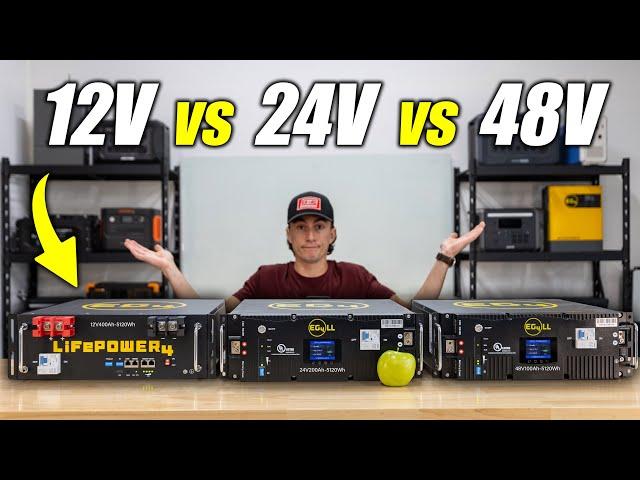
Which is Best? - 12 vs 24 vs 48 Volt Solar Batteries Explained
➡ Current Deals: https://signaturesolar.com/promotions?ref=thesolarlab
➡ Use Code: THESOLARLAB50 for $50 Off
🤓 Watch the rest of the videos in this playlist: https://www.youtube.com/playlist?list=PL23_m8HBj7OJQSt1fGveO_rQgn4-zYBB0
⚡️ Take Our Quiz to Find Your Perfect Power Station!
➡ https://quiz.typeform.com/to/zpvK6MPQ
0:00 - Intro
0:29 - 60 Second Electricity Lesson
1:39 - 12V Batteries
3:06 - 24V Batteries
3:53 - 48V Batteries
5:31 - Summary
Curious about the differences between 12V, 24V, and 48V batteries for your solar power system? In this video, we break down the pros and cons of each voltage, how they affect performance, cost, and which one is best for your setup.
🔔 Subscribe to our YouTube Channel: @TheSolarLab
⚡️ FOLLOW US:
https://www.instagram.com/thesolarlab/
https://www.tiktok.com/@thesolarlab
👨🏼💻 The Solar Lab:
https://www.thesolarlab.com
We maintain an affiliate relationship with some of the products reviewed, which means we get a small percentage of a sale if you click our links, at no cost to our viewers.
Тэги:
#solar_explained #how_does_solar_work #solar #explained #electricity_explained #electricity_basics #volts #amps #watts #free_course #learning_solar #intro_to_electricity #solar_generator #best_budget #power_station #portable_power_station #beginner #basic_solar_components #solar_power_system #inverter #solar_panel #battery_bank #solar_panels #array #solar_array #what_size #12v #48v #batteries #24v #lithium_ion #lithion #LiFePO4 #solar_battery #12_vs_24_vs_48 #12_volt #24_volt #48_voltКомментарии:

Thank you for the explanation.
Ответить
We neee a “Thick” counter
Ответить
Hmmm. Could one create a 120volt system by series connecting 2 x 48v and 1 x 24 volt batteries? Does that make any sense to do?
Ответить
The one down side of higher voltage is the battery packs get heavier to the point where you can't pick them up i.e. 100lbs or more for 48 volt 100ah battery. Also the battery management needs to monitor more cells in series so there are more little wires running around and more connections between cells to keep tight. Then there's the arcing at higher voltage with DC you need to be really careful.
Ответить
24v 3,500 watt inverters are cheap. Truckers use em.
Ответить
The the Eco flow wave 2 can run continuously on 24v battery.
Ответить
Appreciate the video. Good info, explained in a simple and clear manner.
What if I can save several hundred dollars on a multi battery setup and just run the batteries in series to get 48V?

24 volt batteries are used in heavy equipment. Dozers, loaders, etc.
Ответить
That's funny because I read a 12 volt system in my truck at 10,000 Watts
Ответить
Any plans to test the Dabbsson line?
Ответить
Great video, you guys are fantastic. So if I purchase a small Sprinter RV with a 12 volt ac, a 120 volt refrigerator, propane cooktop, a tv, 12 volt led lights and some 120 outlets would I benefit from a 48 volt system?
Ответить
Robby? So this is where youve been. Hmm.
Ответить
What happened to robbie, will we ever get an update?
Ответить
When are you going back to cars?
Ответить
Lmfao not a very budget friendly system
Ответить
48V is good for long term invest.
Ответить
FINALLY……someone illuminated volt, amp and watt in a way my tiny mind can see!
Ответить
now this is a good video explaining voltage.
could never understand voltage but now i do.

One caveat to your skip 24V statement is if your setup is running DC load components w/o an inverter.
Ответить
I can 2x this information. Don’t waste your time with 12v or 24v. Just go straight to 48volt batteries and inverters etc. If you need 12volts then use a step down converter from 48v to 12v. The options for 48v stuff is huge compared to 12v.
JUST GO WITH A 48VOLT SYSTEM!!!! DONT WASTE YOUR TIME AND MONEY.
like me….
“Oh my rv and lots of its stuff is 12v so I’ll just buy a bunch of solar panels(6-200 watt) and 15kwh of 12v eg4 batteries and just a little 2000watt inverter to run my fridge 100% in a hurricane or if the power goes out.”
Flash forward 7 months.
“Man, I can fit like 11 more solar panels on my roof and prolly get rid of my generator and add 3 more batteries and then prolly power 2 air conditioners with all that solar. Oh goddamnit I need 0000 size cables and I can only get 3kva inverters and now I need 2 and gotta put them in splits phase and get a lynx distributor and more cables and. Fuck!”

Excellent vid. Thank you. I'm just starting my list. so 48v to start. What's next? I have a 900 s/f home.
Ответить
I built my system back in 2020 48v components were hard to find and expensive. Back at that time Will Prowse was recommending 24v system for medium system like my 250 square ft cabin. I bought a Big Battery 24v 170ah lifepo4 ,2000w inverter and 1000 watts of panels. I use it about it about 120-150 days a year and I'm using the exact system I started with and no down time.
Ответить
I'm glad to have this channel ever since Will P told me to go F myself. That guy needs to relax on the politics.
Ответить
You are clearly living true to your ideal. Thanks for your explanations. (DoMore)
Ответить
Also charge controllers are far more effective at 48V than at 12V. A 20A charge controller at 12.8V can handle up to 256W worth of solar panels. That SAME controller at 51.2V can handle over 1000W (assuming a controller that does 12/24/36/48V of course, but many do these days). Just as an example.
Convenient kitchen appliances... Microwave, induction tea kettle, toaster oven, induction "burner", well pump.... the list goes on. Best to just go straight to 48V (51.2V LiFePO4) in most situations. In fact, I would only consider 12V at far lower wattages than the channel recommends. If its less than 500W then 12V is an option. If its more, or you might scale higher than 500W, then I'd go straight to 48V.
At 48V, 2 AWG main battery and inverter wiring nets you 100A @ 51.2V = 5000W of continuous power without anything even getting warm to the touch, let alone hot. And all the solar panel string and charge controller output wiring can be 10 AWG.
The only real gotchas with 48V is that (A) You need to be a bit more up on your electronics skills. (B) Getting any fusing and breakers right is more important. And (C) you need to pay more attention the solar panel topology. The best charge controllers are buck controllers (Victron's for example) which means that to work properly with a 48V system the solar strings have to generate roughly 65VDC or higher "operating voltage".
---
For string voltages I shoot for at least 70V. Higher if partial shading might be an issue. My go-to charge controller is thus something like a Victron 150/35 for the voltage range it supports rather than a Victron 100/20. A single 150/35 can handle 1800W worth of generation all by its lonesome.
You can do this with any solar panel wattage but you need to figure out how many in series you need to get decent results, plus one more to help deal with partial shading situations. Even 25W panels would work, but you would need 4 x 25W in series to develop a decent voltage for a 48V system. Similarly for other small panels. When you get to more serious panels... 100W you typically need 3 x 100W in series (but if they are low-voltage 100W panels you'd still need 4). 200W panels you would also typically want 3 in series. Higher than that the voltages are higher so typically residential panels would need only 2 in series.
My go-to is always 48V. I only consider 12V for very very small systems and only consider 24V in very special cases. My default is 48V these days.
-Matt

Super useful video
Ответить
Great info…. Thank you
Ответить
48V is the way to go! Nice vid, thanks.
Ответить
What about safety considerations for the beginners that this video seems aimed at? Is it much easier to get yourself in trouble/danger handling 48V stuff? What are the most important safety cautions for the beginner? If that kind of info isn't in that playlist you mentioned, perhaps it would be a good candidate for another video.
Ответить
What's the functional difference between 4 12-volt batteries wired in series and a 48-volt battery composed of 16 3.2-volt cells?
Ответить
Thank you very much for the comparison explanation. You do great videos and give excellent advise. 🙏🏿👍🏿
Ответить
Thank you For These Videos. I Learn A Lot
Ответить
Odd question… I want to boost my RV’s capacity as I use PC, Monitors, NAS, and other 120v devices like AC for months while traveling. What about inverter drain on a 48v system? I’m guessing that in addition to a step up inverter, I would also need to have a step down inverter too, as the 12v RV systems, refrigerator, lights, etc. run that. I know that I’ve powered everything down for the night and forgotten to turn the inverter off, and the drain is noticeable by morning. Does a 48v system require an inverter to be on 24x7 for the 12v RV systems?
Ответить
Good info.
Ответить
It seems like your animation and the way you described watts might be out of sync. Watts are Joules per second. Saying it’s like the total water in the bucket is not quite it. Like your animation, watts are more like how much water travels out of the hose in a second.
The amount in the bucket is Joules or watt-hours.

Why does no one make a 120v battery?
Ответить

























